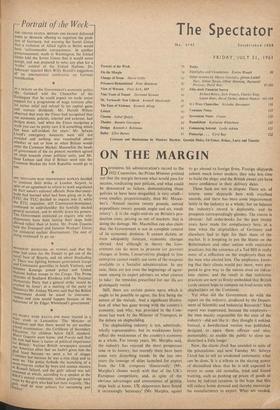—Portrait of the Week— THE UNITED STATES, BRITAIN AND FRANCE
delivered notes to Moscow offering to negotiate the prob- lem of Germany, but warning the Soviet Union that a violation of Allied rights in Berlin would have 'unforeseeable consequences.' In another pronouncement, made in Washington, the United States told the Soviet Union that it would never :accept, and was prepared to veto, any plan for a troika' control of the United Nations. Dr. Adenauer rejected Herr Willy Brandt's suggestion of an international conference on German reunification.
IN A DEBATE on the Government's economic policy Mr. Gaitskell told the Chancellor of the Exchequer that he could expect no trade union support for a programme of wage restraint after his surtax relief and refusal to tax capital gains and restrain dividends. Mr. Harold Wilson Observed that even the Times had recognised that our economic policies, internal and external, had broken down, 'and when the Times recognises a truth you can be pretty sure it is something which has been self-evident for years.' Mr. Selwyn Lloyd's emergency measures were still not revealed and nothing was vouchsafed about Whether or not or how or when Britain would enter the Common Market. Meanwhile the heads Of government of the six present members agreed on steps towards closer political unity, and Mr. Sean Lemass said that if Britain went into the Common Market the Irish Republic would go in too.
ONE THOUSAND BOAC maintenance workers decided to continue their strike at London Airport, in Spite of an agreement to return to work negotiated by their union's national officials. Now that every- body had learned what had been going on in the ETU, the TUC decided to inquire into it, while the ETU executive, still Communist-dominated, continued to cold-shoulder the lawfully elected general secretary, and to whittle down his powers. The Government instituted an inquiry into why Shipowners have been having their ships built abroad rather than a' home. Mr. Frank Cousins held the Transport and General Workers' Union for unilateral nuclear disarmament. The cost of living continued to go up.
PRESIDENT BOURGUIBA OF TUNISIA said that the time had come for the French to get out of the naval base of Bizerta, and set about blockading it- There was fighting between government troops between Communist guerrillas in South Vietnam, and between Katanga armed police and United Nations Indian troops in the Congo. The Prime Minister of Southern Rhodesia told the National Democratic Party that a general strike 'would be crushed by force'; at a meeting of the party in Bulawayo Mr. Joshua Nkomo said that the British Government should be asked to intervene: Strikes and riots would happen because of the behaviour of Sir Edgar Whitehead's government.'
X PEOPLE WERE KILLED and many injured in a SIX crash in Lancashire. The Minister of Education said that there would be yet another „school examination---the Certificate of Secondary e.ducation, for children below GCE standard. ,M.ttlor Gagarin went home. and Pravda said that his visit had been 'a factor of political importance for Britain.' Various British newspapers assured bur American allies that we hadn't given him the glad hand because we were a lot of sloppy Commies but because he was a nice chap and so ,,were We. The police forbade the launching of a 'even-foot-six rocket by boys and science masters at Reissall School, and the girls' school was left jinamed at which, according to a speaker at the "MA's annual conference, yellow golliwogs were
by the girls who had lost their virginity, 'like
6, iris used to wear colours for swimming and nockey:


















































 Previous page
Previous page